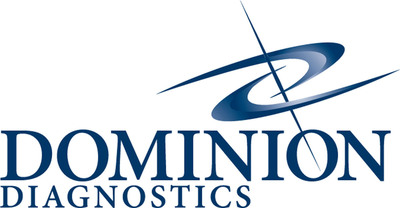NORTH KINGSTOWN, R.I., Sept. 23, 2014 /PRNewswire/ -- Scientists in the open access journal PLOSONE reported today on a comprehensive systematic evaluation of compliance to prescribed treatment medications and abstinence from psychoactive drug abuse in chemical dependence programs. The evaluation utilized data from an advanced drug urine screen called Comprehensive Analysis of Reported Drugs (CARD)® developed by Dominion Diagnostics, LLC of North Kingstown, Rhode Island.

Mary Hauser, Vice President of Addiction Services & New Market Development at Dominion Diagnostics stated "We developed CARD to be a sophisticated urine drug analysis to assist chemical dependency programs in not only assessing both compliance to Medication Assisted Treatment (MAT) and abstinence from licit and illicit psychoactive drugs during treatment, but also as a biological tool to improve clinical outcomes for patients."
The design of the study was implemented following meetings with Dominion's Scientific Advisory Board (SAB). The statistical analysis was performed independently by David Han, PhD at the University of Texas at San Antonio under the direction of Kenneth Blum, PhD, Chief Scientific Advisor of Dominion's SAB and lead author of the study.
This is the first quantitative analysis of data from urine drug tests, for compliance to treatment medications and abstinence from drug abuse across levels of care in six eastern states. Data collected in 2010 and 2011 from 10,570 patients was filtered to include a total of 2,919 patients prescribed at least one treatment medication. While both compliance and abstinence were found for many patients, there was a significant lack of compliance (32.8% non-compliant) and abstinence (60.8% non-abstinent) when only the first and last urine specimen was analyzed (5,838 specimens). However, a longitudinal analysis (every urine specimen analyzed) in a subset of 17% of patients (n=511) found a very robust significant upward trend of improvement in both compliance and abstinence.
For all patients tested compared to non-compliant patients, compliant patients were marginally less likely to abuse opioids, cannabinoids, and ethanol during treatment. Following the program prescribed, including illicit drugs but not smoking, abstinence was significantly higher in residential than in non-residential treatment facilities. Moreover, in 2010, 16.9% of the patients (n=57) were abstinent at first sample but were not abstinent at last sample, a sign of deteriorating abstinence behavior. However, the percentage dropped to 13.3% (n=174) in 2011. This improvement over years was statistically significant and could be attributed to the appropriate use of CARD supporting the original hypothesis considered by the SAB and scientists at Dominion Diagnostics.
Dr. Blum described the report as being a landmark because it is indeed the only experiment known to systematically address both compliance to treatment medications and licit or illicit drug abuse during treatment in chemical dependency programs across the eastern part of the United States. He stated, "while medications have been approved by the FDA for use to help patients with alcohol and drug dependence, many patients do not take the medications as prescribed and many use drugs of abuse during this medically assisted recovery."
John Femino, MD is a member of Dominion's SAB, co-author of the study and a former regional director for the American Society of Addiction Medicine (ASAM). "While we the authors caution our peers by stating that any interpretation of these important results requires further intensive investigation, these findings may have profound clinical relevance in terms of the importance of appropriate urine drug screening in the addiction field," Femino pointed out. "The use of CARD may lead to reduction of falsification of patient self-reporting about current drug misuse or abuse and potential translation to improved clinical outcomes."
Stewart Gitlow, MD, current president of ASAM, presented Dr. Blum and associates with the ASAM Medical-Scientific Program Committee Award for Best Scientific Abstract at the 40th Annual ASAM Meeting in Orlando, FL in April 2014 for their work related to this now published PLOSONE article.
About Dominion Diagnostics
Dominion Diagnostics is a leading national laboratory that offers clinical drug testing, prescription monitoring services, and a full suite of clinical support solutions. Since 1997, Dominion Diagnostics has provided services to clients representing a diversity of medical specialties across the United States, including addiction medicine, behavioral health, pain medicine, primary care, psychiatry, and hospital systems. Dominion Diagnostics is supported by a world-class team that shares a commitment to clinical excellence, compliance, and integrity. For more information, please visit www.dominiondiagnostics.com.
For Media Relations, contact:
Julie K. Lenahan, MBA, Director of Marketing, Dominion Diagnostics, (401) 667-0876, jlenahan@dominiondiagnostics.com
Logo - http://photos.prnewswire.com/prnh/20140204/NE57628LOGO
SOURCE Dominion Diagnostics




